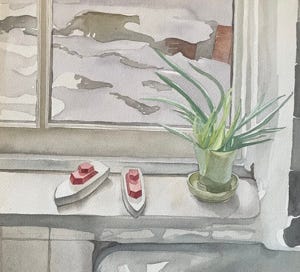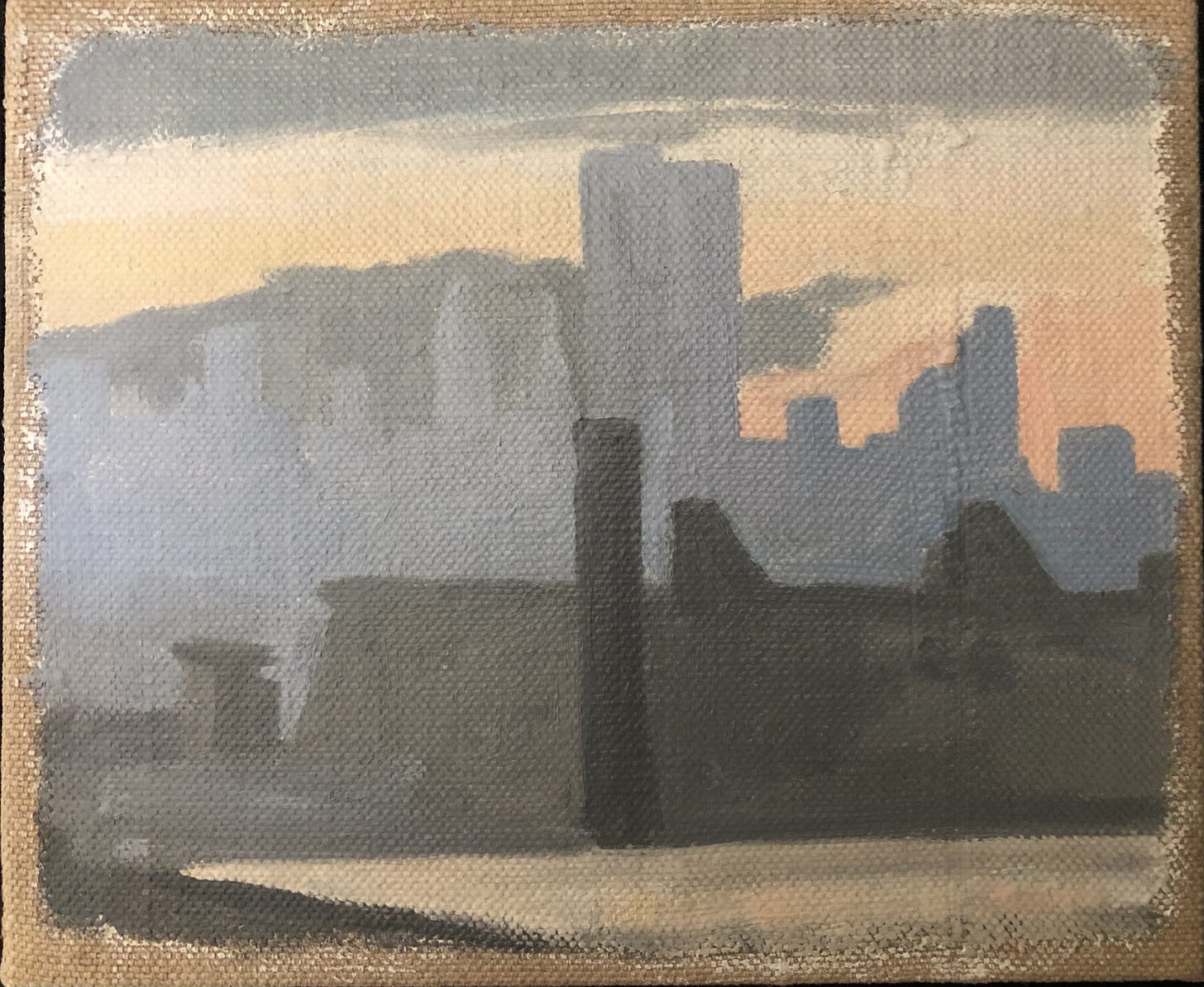Two Houses. Two Painters. Two Parents. is a newsletter of stories about art, feminism, grief, and time excavated from the Soho loft where I grew up. Posts are free and illustrated with the work of my long-divorced parents, the painters Mimi Weisbord and Lennart Anderson. Sign up here:
Our parents loved us. I do know that. Evidence includes the many stories from childhood they told about me and my brother Orrin.
I know, for example, that before I came along, Orrin had a family of imaginary friends. Mom loved telling stories about us as little people, and so I know that Orrin’s imaginary friends included Bo Bo and Blocky and Haw Haw. I know from both my parents that when I was a toddler, I was terrified of going down the drain, and one sure way to get me out of the tub was to pull the plug, at which time I would come flying into my mother’s waiting towel. “There you go!” she’d sing. And if I wanted out of the tub, I’d cry, “There you go! There you go!” mimicking her.

I know that I learned to speak in sentences, not words. “Let’s take a walk to see the ducks,” was another of my early repertoire, as well as “Don’t stick me!” for diaper changes involving safety pins.
We were celebrated as little kids, Orrin and I.
More evidence: Orrin was gifted a quarter-sized water turtle when I was born (two turtles, actually, but “Harry” died, a part of family history we don’t much like to think about). “Brownie” was a sort of consolation prize for Orrin having to share his parents. He was about to turn three years old, and he, too, would have something to care for, just as Mimi and Lennart would have a new baby girl.
Indeed, our parents loved us. They even shared custody of us after they split, unusual for the early Seventies. But Orrin had little reason to love me. Turtle aside, his life did not improve with my entrance into the world.
Fragmented as well as more elaborate memories yield this conclusion. There’s also a damning picture: Orrin sits with me, swaddled tightly on a pillow on his lap. He is looking up at the camera, miserable, with beautiful, tired brown eyes set beneath his dark bowl cut. On the pillow, my head is thrown back, my mouth open wide. It’s a picture worth a thousand decibels.
One memory places Orrin and me in the second-floor bathroom of our brownstone on Union Street in Brooklyn (where we’d all started before the divorce). The bathroom has a stained glass window that casts a jewel-toned Tiffany-style pattern into the stairwell. Memory places me and Orrin there, standing on the black and white hexagonal tiles next to the pedestal sink; Orrin is awkwardly, grudgingly working to get me out of my diaper. He must have been all of five or six years old.
More terrible stories of injustice: I was overwhelmed with jealousy toward any advantages he had for being older or smarter, and he did tease me routinely to the point of speechless rage. I had none of his verbal arts or strategies, hence my biting or landing a punch to his shoulder with everything I could muster. He made a career of dramatically crumpling to the floor, gripping his arm, and crying out, “Oh the bone, the bone!” because he was so skinny. We fought often after our parents separated. More than once, I went to get him ice.
When I was little, I couldn’t stand that he had an extra half hour before bedtime. Mine was 7:30, and his was 8. I think. Or it was 7 and 7:30. I’m certain he knows to this day. He will not ever forget. I think my mother even raised this debacle with me one last time toward the end of her life, “It was only fair, but you wouldn’t let him! He was three years older, but you just wailed and protested.” (It was a cathartic adult moment when calmly, I noted, “You’re the ones who let a four-year-old win.”)
Still, the evidence collects that I was a jealous hellion who screamed for what she wanted out of frustration for my intellectual disadvantages. Orrin, meanwhile, did the occasional nice thing, which I graciously accepted. I was the youngest, after all. Nice things were supposed to come my way. Once in a while, he would use his own money at the Grand Army Plaza newsstand and buy me a chocolate cherry, the kind in syrup. After our parents split, Mom moved to an apartment on Plaza Street, and we got to know that newsstand well. I loved those cherries. And I felt special when he’d do that, and I felt close to him. And never, not once, did I return the gesture.
Then, when I was ten and Orrin thirteen, he received his first ten-speed bicycle, and my jealousy shot through the top of my head in a way I had no idea was possible. These new racing-styled bikes had curved handlebars and gears with little levers to switch. His was a white Peugeot from Dixon’s bike shop down the street from the brownstone where we lived with Dad part-time after the split. He bought it for him, and I began to lose my cool.
I argued my case all the way back up the block. Dad acted amused. Orrin less so. When we got to the house with this new beautiful adult instrument of propulsion, it became clear this was not going in the space under the stoop where we had always kept the bikes and where they became rusty. This bicycle would need to be stored inside, and Dad was not about to look at it in the hallway. Orrin was strong enough to carry it up the stairs to his very large room. The stairs are steep, and there’s a turn at the landing, but he managed with the crossbar at his shoulder.
All at once, Dad had an idea. “You can have a ten-speed when you can carry it up the stairs.”
“Really?” I was standing on the parlor floor by the giant ornately framed mirror with a built-in bench and brass hooks for coats. ”So, when I can carry his bike up the stairs, I can have one just like it?”
Orrin looked wary. But Dad was pleased with this tangible test. Often, in such moments, his tortoise-shell glasses slid just a little down the bridge of his nose. “Yes,” he said.
(It seems worth mentioning that Mom always said of her first-ever view of me: “The doctor held you by your ankles, and there you gleamed, just rippling with muscles.”)
The next time we came home after a ride around Prospect Park, I asked to try to carry Orrin’s bike up the stairs. Dad loved it. Orrin looked miserable.
I had just spent a humiliating afternoon listening to him figuring out his new gears and how to shift without strain, watching him take on the “big hill” with ease and frenetic peddling, and then power himself down with slow-motion pushes. Even our dad’s bike, an English variety, was no more than three speeds. (Mine had one!) Here was the latest and greatest, and there were many park peddlers whizzing by in similar (but much better) equipment.
Back at the house, powered by adrenaline and the promise of this carnival challenge, I hoisted Orrin’s new bike up the stoop (relatively easy) through the double doors and vestibule (already opened) and to the bottom of the steep, narrow stairway with the Victorian banister on my left and mahogany paneling on my right.
Dad was impressed. Orrin couldn’t believe it was really happening.
I was fueled by an opportunity to impress my father. These chances did not often come around. And so, I hoisted the bar over my shoulder, heaved it up those narrow stairs in one rushed motion, placed the bike triumphantly in the hallway, earned my orange bicycle — the identical model to my brother’s — and promptly never repeated the feat. It was, from that day forward, too heavy for little me.
In the bleak days that followed, Mom was extremely sympathetic to Orrin. This was a ridiculous thing to do to a thirteen-year-old boy. He did not get such a bike at age ten. He’d waited three more years.
But Dad would not go back on his word. A deal’s a deal, he said weakly (besides, I already had the bike). By this time, I don’t think she was often calling him, but this offense was so bad I recall she did. Finally, I heard him on the phone, acknowledging he should never have offered the challenge. I heard the concession, and my triumph deflated. Worse, I could not much manage this bicycle, could barely reach the pedals, and dared not say a word. The seat was also too hard. All of this, penance, somehow, for so much jealousy.
In summary, losing his imaginary friends by gaining a genuine sibling and a baby water turtle did not go well for my brother.
Orrin had what I would never get, however.
Three extra years with our parents together.





...and Two Children. Bringing Orrin into the portrait you are painting of your family added much, and as usual selecting the painting to illustrate your text is brilliant. Looking forward to the next installment. https://www.bing.com/videos/riverview/relatedvideo?q=you+tube+you%27ll+never+go+down+the+drain&mid=86C170F731084DE42AD686C170F731084DE42AD6&FORM=VIRE
This is charming and so vivid - the newsstand and the chocolate cherries. I laughed at 'Oh the bone, the bone!' (I'm assuming it was a lot of noise for not that much suffering).